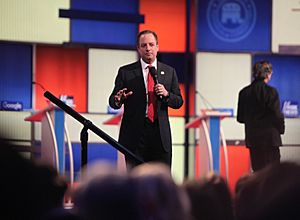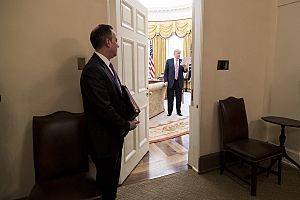Reince Priebus facts for kids
Quick facts for kids
Reince Priebus
|
|
|---|---|
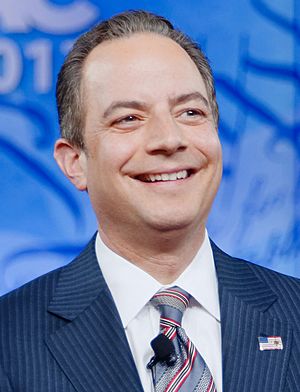
Priebus in 2017
|
|
| 27th White House Chief of Staff | |
| In office January 20, 2017 – July 31, 2017 |
|
| President | Donald Trump |
| Deputy | Katie Walsh Joe Hagin Rick Dearborn |
| Preceded by | Denis McDonough |
| Succeeded by | John F. Kelly |
| 64th Chair of the Republican National Committee | |
| In office January 14, 2011 – January 19, 2017 |
|
| Preceded by | Michael Steele |
| Succeeded by | Ronna McDaniel |
| Chair of the Republican Party of Wisconsin | |
| In office January 19, 2007 – January 14, 2011 |
|
| Preceded by | Richard Graber |
| Succeeded by | Brad Courtney |
| Personal details | |
| Born |
Reinhold Richard Priebus
March 18, 1972 Dover, New Jersey, U.S. |
| Political party | Republican |
| Spouse |
Sally Sherrow
(m. 1999) |
| Children | 2 |
| Education | University of Wisconsin, Whitewater (BA) University of Miami (JD) |
| Military service | |
| Branch/service | |
| Years of service | 2019–present |
| Rank | Lieutenant |
| Unit | Bureau of Naval Personnel |
Reinhold Richard "Reince" Priebus (born March 18, 1972) is an American politician and lawyer. He also serves as an officer in the Navy. Priebus was the chairman of the Republican National Committee (RNC) from 2011 to 2017. He also worked as White House chief of staff for the first six months of Donald Trump's presidency.
Priebus grew up in Wisconsin. He became a lawyer and worked for a law firm. In 2007, he was chosen to lead the Republican Party in Wisconsin. Later, he became the main lawyer for the Republican National Committee. He was elected chairman of the RNC in 2011. As chairman, he often spoke about the policies of President Barack Obama. He also led the Republican Party during the 2012 and 2016 presidential elections. He supported Donald Trump after Trump became the Republican nominee. Priebus served as Trump's chief of staff from January to July 2017. He had the shortest time in this role for a permanent chief of staff in American history.
Contents
Early Life and Education
Reince Priebus was born on March 18, 1972, in Dover, New Jersey. When he was seven, his family moved to Green Bay, Wisconsin. His father was an electrician, and his mother was a real estate agent. His family has German, English, and Greek roots.
At 16, Priebus started volunteering for political campaigns. He went to George Nelson Tremper High School in Kenosha, Wisconsin. After high school, he studied English and political science at the University of Wisconsin–Whitewater. He was elected student body president and graduated with honors in 1994.
After college, Priebus worked for a committee in the Wisconsin State Assembly. He then went to the University of Miami School of Law in Florida. While studying law, he worked for different courts. He also interned at the NAACP Legal Defense and Educational Fund.
In 1998, he earned his law degree with honors from the University of Miami. He moved back to Wisconsin and became a lawyer. He joined a law firm called Michael Best and became a partner in 2006.
Starting His Political Career
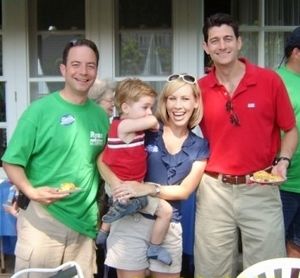
In 2004, Priebus ran for the Wisconsin State Senate but did not win. In 2007, he was elected chairman of the Republican Party of Wisconsin. He was the youngest person to hold this position. Two years later, in 2009, he also became the general counsel for the Republican National Committee (RNC).
As chairman of the Wisconsin Republican Party, Priebus helped the party win many elections in 2010. The Republican Party gained control of the State Senate and Assembly. A Republican also became governor. Priebus worked to unite different groups within the party.
He continued as state party chairman and RNC general counsel until 2010. Then, he decided to run for chairman of the RNC.
Becoming RNC Chairman in 2011
On December 5, 2010, Priebus left his role as general counsel for the RNC. The next day, he announced he wanted to be the next RNC chairman. Wisconsin Governor Scott Walker supported Priebus. Walker said Priebus's leadership helped the party win in Wisconsin. Priebus promised to manage money carefully and raise funds. He wanted to make sure the party was successful.
On January 14, 2011, Reince Priebus was elected chairman of the RNC. He won after several rounds of voting.
Leading the Republican National Committee (2011–2017)
First Term as Chairman
When Priebus became RNC chairman in January 2011, the organization had a large debt. It also had problems with major donors. Priebus set goals to reduce the debt and improve the RNC's finances. He also wanted to help Republicans in the 2012 United States presidential election. He planned to create a strong program to encourage people to vote. This included improving voter registration. By the end of 2011, Priebus had raised over $88 million. He also cut the RNC's debt significantly.
During the 2012 presidential election, Priebus often spoke out against President Obama. He appeared on many political TV shows. He continued to focus on raising money for the RNC. By the end of 2012, the organization had no debt. After the Republican loss in the election, Priebus called for changes. He wanted the party to improve how it talked to young people, women, and Hispanic voters. He also started a project called "The Growth and Opportunity Project." This project aimed to create a long-term plan for the party.
On January 25, 2013, Priebus was re-elected for another term as RNC chairman. He ran without anyone opposing him.
Second Term as Chairman
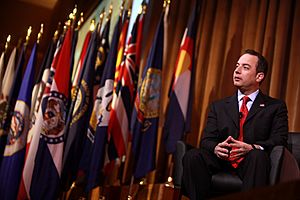
For his second term, Priebus wanted to "transform the party." He said the party would no longer think about states as only "red" or "blue."
On March 18, 2013, Priebus shared the "Growth and Opportunity Project" report. This report was based on a four-month study. It suggested ways for the party to improve its operations. Plans included improving digital tools and reaching out to minority communities. It also suggested supporting immigration reform. Another goal was to shorten the presidential primary season.
In September 2013, Priebus convinced CNN and NBC News to cancel planned movies about Hillary Clinton. He argued that these movies would help Clinton's campaign. Priebus said these networks would not be allowed to host Republican debates if the films were made.
In 2014, Politico reported that Priebus was making progress. He was working to make the RNC active all year round. This included investing in digital technology and staff across the country.
In May 2014, the RNC launched the Victory 365 program. This program aimed to encourage volunteers across the U.S. to connect with people in their communities. It was part of Priebus's goal to improve voter outreach.
Priebus also worked to shorten the presidential primary calendar. He helped change RNC rules to make the primary season shorter. This also moved the national convention earlier. The rule change was approved in January 2014.
Following the "Growth and Opportunity Project" report, Priebus led efforts to reach out to Black, Latino, and Asian American voters. In July 2014, he spoke at a convention for Black journalists. He said the Republican Party was spending a lot of money on these efforts. They had also opened offices in 15 states.
On October 2, 2014, Priebus presented the RNC's "Principles for American Renewal." These were 11 goals for the Republican Party before the 2016 United States presidential election. The goals included creating jobs and caring for veterans. They also included immigration reform and reducing government spending.
On January 16, 2015, Priebus was re-elected for a third term as RNC chairman. The vote was almost unanimous.
Third Term as Chairman
On October 30, 2015, after a Republican presidential debate, the RNC announced a change. NBC News would no longer host a debate planned for February 2016. Priebus was concerned that the previous debate had been unfair. He said the moderators asked "gotcha" questions. He felt they were trying to embarrass the candidates.
During the 2016 presidential campaign, Priebus had discussions with then-candidate Donald Trump. Priebus publicly disagreed with some of Trump's ideas. However, after Trump became the likely nominee, Priebus worked to build a good relationship with him. He helped unite the party behind Trump. Priebus stated that running a third-party candidate would be very bad for the Republican Party.
After Trump won the Republican nomination, Priebus continued to support him. On October 4, Priebus called Trump a role model. He said Trump had built businesses and lived the American dream. After a widely discussed recording of Trump was revealed, Priebus announced the RNC would continue to support Trump.
On November 13, 2016, after winning the presidential election, Donald Trump announced his choice. He named Reince Priebus as his White House chief of staff.
White House Chief of Staff (2017)
As White House chief of staff, Priebus had a lot of control. He managed who could enter the Oval Office to meet with President Trump.
Priebus served as chief of staff from January 20, 2017, until July 31, 2017. On July 27, Priebus stated that he had resigned. The next day, President Trump announced that John F. Kelly would be the new chief of staff. Priebus stayed in the White House for a few weeks to help Kelly transition into his new role. His time as chief of staff was the shortest for a permanent chief of staff in U.S. history.
After the White House
After leaving the White House, Priebus returned to his law firm, Michael Best. He became president and chief strategist there. He also became a speaker with the Washington Speakers Bureau.
On June 10, 2019, Priebus joined the United States Navy Reserve. He was commissioned as an ensign, which is a junior officer rank. He serves as a human resources officer. Vice President Mike Pence swore him in. Priebus said he felt called to serve after meeting the family of a Navy SEAL who died in action.
On February 11, 2020, President Trump announced his plan to appoint Priebus to a commission. This commission helps select White House Fellows. Priebus was also the chairman of the host committee for the 2024 Republican National Convention in Milwaukee.
Priebus has been mentioned as a possible candidate for political office in Wisconsin. This includes the 2022 governor's race and the 2024 U.S. Senate race.
Personal Life
In 1999, Reince Priebus married Sally L. Sherrow. They met when they were teenagers. They have two children together. Priebus is also an archon of the Greek Orthodox Church.
See also
 In Spanish: Reince Priebus para niños
In Spanish: Reince Priebus para niños
 | Dorothy Vaughan |
 | Charles Henry Turner |
 | Hildrus Poindexter |
 | Henry Cecil McBay |


